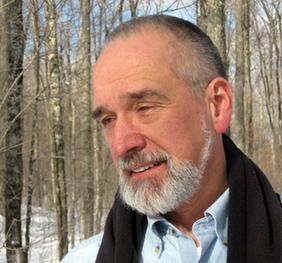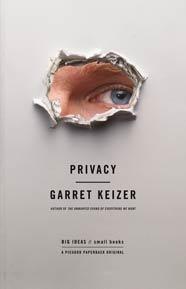 Garret Keizer is the author of seven nonfiction books, the most recent of which is Privacy (Picador, August 7, 2012), which looks at "our strip-searched, over-shared, viral-videoed existence." A contributing editor for Harper's Magazine and a former Guggenheim Fellow, he has written for Lapham's Quarterly, the Los Angeles Times, Mother Jones and the New York Times; his work has also appeared in Best American Essays and Best American Poetry. He lives with his wife in northeastern Vermont.
Garret Keizer is the author of seven nonfiction books, the most recent of which is Privacy (Picador, August 7, 2012), which looks at "our strip-searched, over-shared, viral-videoed existence." A contributing editor for Harper's Magazine and a former Guggenheim Fellow, he has written for Lapham's Quarterly, the Los Angeles Times, Mother Jones and the New York Times; his work has also appeared in Best American Essays and Best American Poetry. He lives with his wife in northeastern Vermont.
On your nightstand now:
I have no books on my nightstand, but the shelf, basket and floor beside my easy chair are full of them. Those on deck right now include The Oxford Book of English Verse, edited by Christopher Ricks; Am I a Jew? by Theodore Ross (in galley); Five Days in May, London 1940 by John Lukacs; Mercy, Mercy Me: The Art, Loves and Demons of Marvin Gaye by Michael Eric Dyson; and Alice McDermott's quietly amazing novel After This, one of a number of fortunate recommendations from my wife.
Favorite book when you were a child:
I vaguely recall a much-worn "Golden Book" about a family expecting a baby, a favorite when my little brother was on his way, and another about a shoemaker and some helpful elves. (I'm still hoping that elves might appear to take over every aspect of my work that requires me to use the Internet.) Later on, I was very fond of the illustrated encyclopedia my parents bought for me and of a child's biography of Chief Black Hawk, whose author I cannot remember. I read it several times in fifth grade and was saddened every time I reached the pages where Black Hawk is defeated and so many of his people are killed. After our daughter was born, and I began to enjoy children's books for a second time, we all loved Sandra Boynton's Moo Baa La La La, Sally Wittman's A Special Trade, Barbara Cooning's Miss Rumphius, Donald Hall's Ox-Cart Man, Laura Ingalls Wilder's Little House books, especially the first two in the series, and Truman Capote's A Christmas Memory.
Your top five authors:
I would have difficulty naming my top 20 authors, let alone my top five. As someone known mainly for his essays, I will name five living American essayists whose work I greatly admire, in no order of precedence beyond the first letter of their last names: Wendell Berry, Joan Didion, Edward Hoagland, Phillip Lopate and Richard Rodriguez.
Book you've faked reading:
One of the targets of my new book, Privacy, is the prevailing notion that "people with nothing to hide have nothing to fear" about covert surveillance or coerced self-revelation. Check it out: If I decline to answer this question, aren't you inclined to assume that I fake reading all the time and perhaps that I've never read a book in my life?
 Book you're an evangelist for:
Book you're an evangelist for:
Evangelist is too strong a word for my bookish enthusiasms, which are, after all, merely "bookish." I do love to give books as gifts, though, but always with this promise: "I will never ask if you read this book." Most recently, I've given Howard Frank Mosher's The Great Northern Express to the young couple who get me out of computer jams; William Trevor's Collected Stories to a former college classmate with whom I exchange a letter every Christmas; the Modern Library edition of Flannery O'Connor's fiction to my godson (now working as a bodyguard and jewelry maker); Terry Eagleton's Reason, Faith, and Revolution to one of my oldest friends and to one of my newest (and to the friend who sent me my first copy of that book, Eagleton's Why Marx Was Right to return the favor); Stephen Dunn's Here and Now to an elderly former professor who lives over the ridge from me and with whom I've swapped poems over the years, Tracy Kidder's Mountains Beyond Mountains to a young woman who's just graduated high school and aspires to be a nurse; and Norman Maclean's A River Runs Through It to the woman who cut my hair (to pass to her husband, who loves trout-fishing and the movie but has yet to read the book. It gives me almost as much pleasure to imagine him doing so for the first time as it does to imagine myself fishing in Montana for the first time.)
Book you've bought for the cover:
I have never bought a book solely for its cover, unless you count the New Directions paperbacks of which I am an amateur collector. I like the list, I like black-and-white photography in general--but mostly those covers evoke nostalgia for that occasion in my youth when I saw them for the first time in the book department of Meyer Brothers department store (gone now) in Paterson, N.J., and shelled out some of my lawn-mowing money for my own copy of William Carlos Williams's long poem named for that city, where I was born and through which my imagination continues to wander.
Book that changed your life:
A far more interesting question, I think, is what book changed the world, and changed it for the better, and if any such book can with complete confidence be said to exist. As for my own rather unremarkable life, formative influences have included The Odyssey, the Bible, Walden by Henry David Thoreau, Howl and Other Poems by Allen Ginsberg, The Temple by George Herbert, several biographies of Samuel Johnson (W. Jackson Bate's and John Wain's were the first I read and among the few books I've read twice), The Autobiography of Malcolm X, the Revelations of Julian of Norwich, the essays of George Orwell and James Baldwin, the novels of Philip Roth and Robertson Davies, Andrea Dworkin's Letters from a War Zone, Kenneth Leech's Subversive Orthodoxy and Albert Camus's The Rebel and his Resistance, Rebellion, and Death.
Favorite line from a book:
One of my favorites anyway: "Go, my book, and help destroy the world as it is," the last sentence of Russell Banks's Continental Drift.
Book you most want to read again for the first time:
The Gospel of Mark.
Your greatest single regret as an author:
That I did not read as avidly, as widely, and as early as I might otherwise have done. That I was too often burdened by the scruple of attempting to finish every book I picked up. When younger writers ask me for advice, I have a long version and a short version for my reply. The short one goes like this: "Read more."

